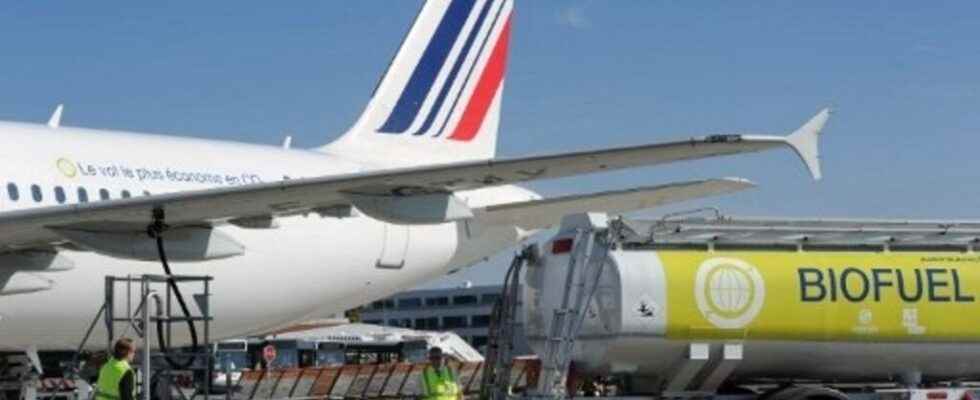Straw on the plane. This is the bet of Frenchman Marc Delcourt. The third great witness in our series devoted to international transport, the entrepreneur runs Global Bioenergies. This fall, this French company should receive authorization to sell a new kerosene. This straw sugar-based biofuel comes the day after a new international aviation agreement to reduce its pollution.
RFI : You run Global Bioenergies, your company which develops a new kerosene for aircraft. What are we talking about when we talk about biofuel?
Marc Delcourt : Biofuels already exist. Mainly for cars, but also for aviation. These biofuels are made from frying oils or plant waste unsuitable for human or animal consumption (beets, cane, soy, etc.).
What is new in your process?
I first want to clarify that plant sugars are very complicated to extract and process. What we are proposing is a new process for extracting vegetable sugars from wood and straw.
That’s to say ?
Our sector concerns second-generation biofuels. We worked a lot with multiple partners to get there.
Worldwide civil aviation imposes very strict rules. To be sold and used, a fuel must be tested and approved. Global Bioenergies is expecting its green light soon?
Yes. And that’s quite normal in a field where engine safety takes precedence. This winter at the latest! While waiting for the agreement of the Advancing Aviation Standard (ASTM), the American organization in charge of approvals (Airbus, Boeing and other foreign aircraft manufacturers sit within it) we are building a factory in the north of France with the sugar bowl Crystal Union. Commissioning is scheduled for 2025.
So France is a pioneer in sustainable aviation fuels?
Yes, with the market leader TotalEnergies. Of the 100,000 tonnes produced per year, France produces 80,000. With our new biofuel plant, we will produce 30,000 tonnes each year.
You point to strong global demand. Which countries are involved?
Global Bioenergies entered the market due to a strong global but above all European motivation. Today the factories exist with a straw sugar extraction factory in Romania. Another concerning wood is in Estonia.
Will your product cost more than the current kerosene?
Yes, three to four times more expensive.
So what interest for companies or countries to buy your biofuel?
But the fight against pollution of course! The transportation industry is an industry that will always pollute. Believing in planes or cars with zero carbon dioxide emissions is a utopia. But we have the opportunity to curb this pollution. Biofuels are part of the solution with five times less pollution than fossil kerosene.
What do you say to ecologists who accuse you of being misleading about the goods since a biofuel (according to international rules) is a product made up of 50% oil industry, 50% vegetable.
I’m not saying it’s a miracle kerosene. It will participate in the planetary building of this fight against global warming.
What is the difference with the evolution of hydrogen aviation?
Ease. Unlike hydrogen, which still requires a lot of infrastructure, research and device changes, our biofuel is immediately consumable. This difference is major since we no longer have time to wait.
A very optimistic view in a world where each country must decide on its biofuel content for its aviation…
It’s true. Everyone should agree. Even an international body capable of imposing more virtuous fuel content. Transportation is a political issue.
Today, Europe and in particular France are seen as pioneers and models?
Today, only France, Norway and Sweden have new laws. They oblige their civil aviation to have biofuel in their engine. But we see more and more states interested.
You say that the West has every interest in investing today in biofuels. Why ?
It’s logic. You can clearly see that the factories and the oil, the raw materials (lithium, nickel, etc.) for the manufacture of transport (batteries, motors, etc.) are on other continents of the world. In Europe, with our agricultural and forestry resources, we have an asset.
But your protective fiber of humanity makes you imagine a future aviation based on everything…
Yes. For years, we relied on all-oil. In terms of automobile transport, for example, we then believed in all-electric and we talk about all-hydrogen. For airplanes as well as for automobiles, we will need all this mixture of solutions. I repeat, zero-pollution is impossible. On the other hand, reducing it by 40 to 50% would not be bad!
